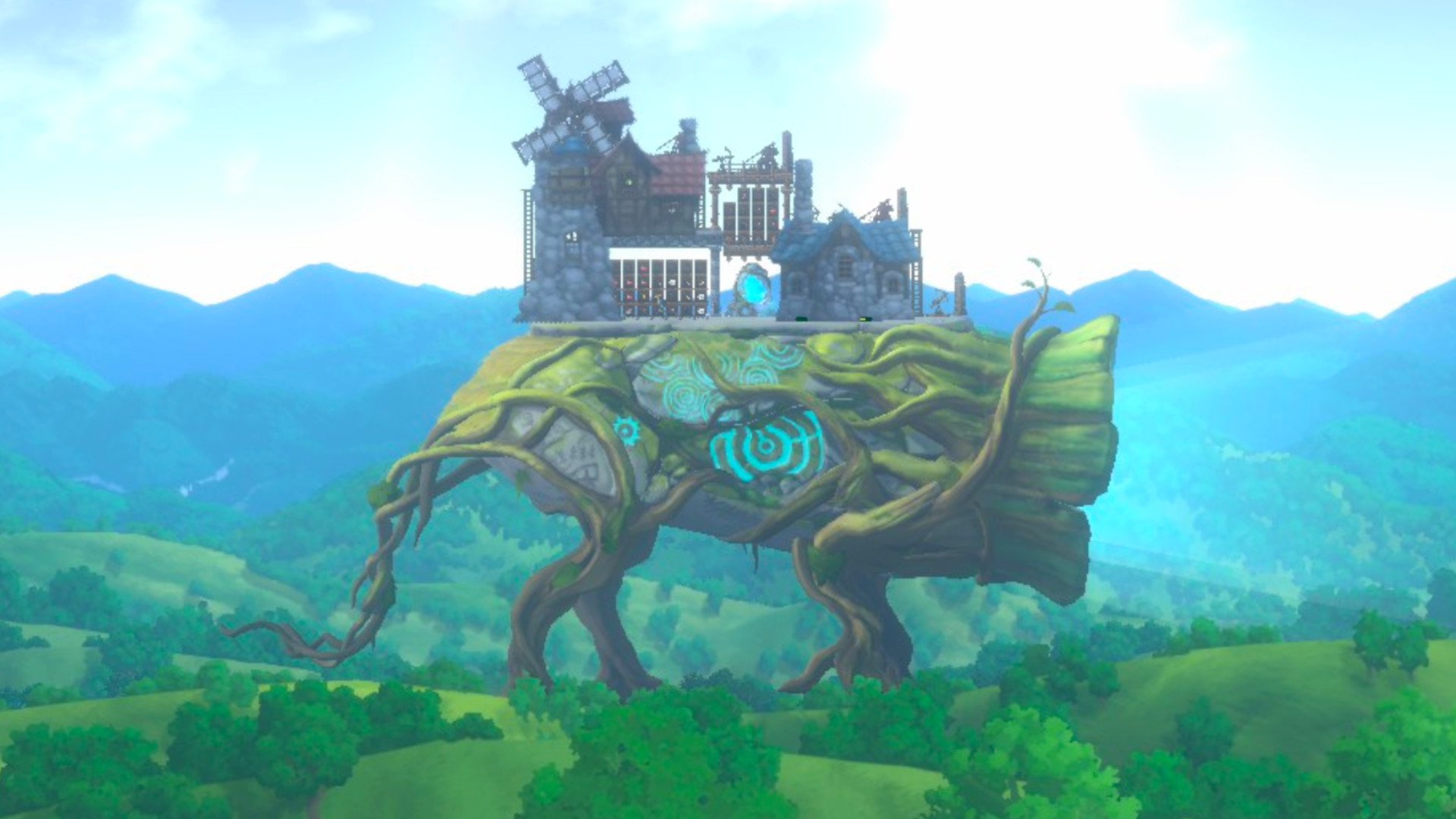In Ark of Charon, the tree of life has been consumed by darkness, and as it died, so too did the world around it. Golems, little goblin-like beings, tend to a newly emerged ray of hope; a seedling mounted on the back of a giant, walking tree creature. But the darkness that killed the tree is still out there, hunting the sprout, so the creature can only rest a while before it needs to move on, outrunning the dark storm. Tranquil base building and intense tower defense combine like the crests and troughs of an ocean wave. In the longer, calmer sections, Ark of Charon is a competent but uninspiring base building game. In the shorter, chaotic combat phases, it’s fiendishly difficult, adding a layer of challenge that drives the game forward but soon proves overwhelming.
City building games — and base building games, too — often fall foul of lengthy tutorials that comprehensively go over all the basics. Ark of Charon’s tutorials are mercifully hands-off, presenting themselves on the side of the screen for you to peruse at your leisure. They’re useful, but there’s no way to read them again once they’re gone, so you’d better take notes. Thankfully, this is an early access game, so you won’t need to remember much just yet.
Despite the lessons imparted by said tutorials, my first run meets a swift, brutal end. I spent time arranging the priorities of the golems, assigning them cooking orders, sending them underground to mine, gathering food on the surface, and planting crops to ensure a steady supply of tomatoes. It’s a similar system to RimWorld’s, only you can’t force assign a specific task.
To protect my supplies and provide a sheltered space for my golems to work, I erect some simple wooden rooms on the stone back of the tree creature — Thistle, I named it. Unfortunately, however, I’d only built a single ballista by the time the storm was nipping at my heels and I had to pack up and move on.
The storm casts a shadow over everything you do in Ark of Charon, as it continuously damages all of your buildings and golems upon impact. However, it’s not the only reason you need to keep moving, as resources are limited. Wooden roots, stone, coal, iron, and other goodies can be mined from below, but once they’re gone, you need to get going.
Weapons can be set to automatically fire or be manually aimed. They’re not 100% accurate, though, so quantity over quality is the game plan — a lesson I learned the hard way. My defenses were overwhelmed, my sapling destroyed. Game over. It was a wake up call, and on my second run the downtime between the combat became a crucial time for planning, not simply a relaxing bit of farming.
On my second run, I make sure to build multiple ballistas and a trebuchet. It does more damage and its projectiles can go through multiple enemies, but it’s inaccurate and takes time to reload. The golems run around grabbing munitions out of the storage to restock the defenses and make on-the-fly repairs.
I erect barricades this time, too, which the enemies seem programmed to target first if you place them in front of your weapons. Through the tech tree you can unlock more powerful weapons that require electricity, and trust me when I say you’ll need them, because the enemies get stronger over time.
Foes drop souls that you can use to create more golems, making everything more efficient, but you have to collect enough of the same type of soul to transform it. This adds a planning element to each run, as you have to take routes that contain enough souls of the right kind.
It’s reminiscent of the systems you find in other roguelike games, but it’s needlessly finicky; you either don’t have enough golems to fully mine out each area, or you run out of crucial resources like stone and iron.
Space is also an extremely limited resource on Thistle — its back isn’t that wide, so you need to build up rather than out. The lower levels get used for storage and production while the upper levels are used for defenses. You can’t just keep building with wood, though, as the structures all have a load limit.
Unfortunately, upgrading them is irritating. You can build a stone structure over a wood one, but they aren’t the same size, so you’ll have to do some manual demolishing and tidying up. Due to the different heights of many structures, this also means you need to temporarily remove all your upper defenses and then reinstall them later. If the storm catches up to you before you’ve got everything rebuilt, you’ll be in trouble.
In Ark of Charon, you build and plan during Thistle’s stops, then you pray your weapons find their marks. Enemy strength ramps up considerably, meaning you’re always on the back foot unless you’re optimizing your downtime perfectly. Then the cycle repeats anew. It’s a frustrating race against time made worse by bland visuals and lack of story, but hopefully the difficulty gets tweaked and there’s some new narrative additions as early access rumbles on.
What will be harder to fix, however, is the game’s lack of soul. While the sight of Thistle ripping itself out of the ground, lifting my home and golems into the sky, was wonderful, the creature itself has no characterization or need for care beyond ensuring the sapling on its back is safe. Unlike the walking base in The Wandering Village, it’s hard to care about our meandering companion.
Ark of Charon is fun for a few runs — it’s easy enough to pick up and play, but it lacks depth and features several frustrating mechanics. While the difficulty is initially a welcome change of pace that drives you to develop quickly, the enemies rapidly outpace anything you’re capable of, turning challenge into sheer frustration.





